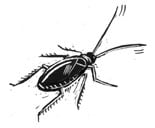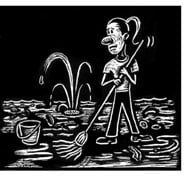Afterword
Pay Night in Houston
At around six o’clock in the evening on my first full day in Houston, a fresh-faced Democratic staffer and I shared a cigarette break. We were outside the dilapidated two-story union building near the Fifth Ward that served as a warehouse for the minions tapped to deliver an unattainable victory for billionaire Tony Sanchez.
The drizzle dampened my cigarette just enough to require a more assertive drag. My warm breath condensed in the evening air. Inside, elected officials and other privileged campaign workers spouted numbers: poll numbers, base numbers, swing numbers, and, of course—almost obscenely— dollar numbers. They mingled without regard for the disenfranchised amongst them, the paid door-to-door walkers who just wanted their small share of the most expensive campaign in Texas history.

The campaign worker smoked and told war stories in the rain. There was one about a man who entered the office looking for work. During the course of the interview, she noticed hundreds of frenzied fleas flying, popping and jumping from the man’s clothes. Needless to say, she felt it only right to continue the interview, as any good liberal would, because he needed a job just like anybody else. But the interview went south when she noticed cockroaches peering, and then escaping from the holes in the man’s trousers. Then there was another man who showed up late for work, and asked if he might do something else around the building. The field director said no, but that he would be happy to take the man to vote. The walker looked at him and said it wasn’t possible: “I’m a nine-time felon.”
My companion laughed uneasily and lit another cigarette. “There are other stories like that,” she said. “Wait until tonight. Your first pay night.”
About this time, vans began to return from the field to drop off the walkers, who had spent the day dropping Tony (“Hardworking As Texas”) literature door-to-door. My colleague and smoking partner instructed me to get inside and prepare. Inside, the staff scurried down the hallway and into the locked offices at the opposite end of the building from the lobby. Everyone hid personal belongings and advised newcomers to do the same. A Houston policeman stationed himself before a bank of television sets to watch a football game.
The virgin politicos, bundled in comfy sweaters and jackets, moved folding tables down the hallways to the front lobby, which created a barrier between the lobby area and the path to the offices in the back. The field director returned from his trip to the bank accompanied by a second police officer and a bag containing thousands of dollars. This had happened almost every day for over a month before I arrived during election week. The cop and the field director sat in a secured office and began to ready themselves for the onslaught of time sheets.
The temperature outside had fallen dramatically while the rain pounded away. Autumn daylight receded quickly into streetlight filled darkness. Sitting inside, I put another sweatshirt on to keep warm. Occasionally I ventured outside to help form lines and instruct people not to move into the warmth of shelter. By the time I came back inside I was soaked.

The first police officer had made his way to the front lobby where the tables now created a makeshift barricade. In imposing fashion, he stood and threatened any walker who tried to loiter inside the building.
The nervous energy amongst the staff intensified. Our adrenaline raced. The lines outside were dangerous. A mugging had occurred during one pay night; a recently released felon robbed a fellow walker at knifepoint. Hungry, tired, and desperate people risked those lines for $50 a day, but not the staff.
Once we were ready inside—secure and protected—the police officer let people in from the freezing rain. The crowd surged like fans at a rock concert, pressing against the glass doors, trying to escape the harsh elements outside. A human turnstile, the officer admitted only one person at a time.
Behind the barricade and armed guard, the staff stood and watched the thrusting crowd. Drenched, dark faces filed into the lobby area; each person holding a soggy green piece of paper signed by a field captain testifying to that day’s work. The quiet nervous energy of the staff was now drowned out by the voices of people jockeying to be the first in line.
My fellow smoker suddenly transformed herself from a reflective do-gooder into a militant actuary, scouring time sheets for discrepancies and questioning the legitimacy of identification cards. A former Clinton aide, recently arrived from New York, barked demands for those in line to behave. With every chastising word from the staffers behind the barricade, the volume and anger of the walkers heightened.
Peering out over those directly in front of me, I saw the hundreds of illuminated brown and black faces beyond the glass doors. Rain pounded their exposed skin. Steam rose from their collective breath, creating a light layer of fog that hung above their heads.
Once submitted, time sheets were handed to staffers, who ran to the secure office in the back. That’s where the field director sat with the small fortune recently retrieved from Mr. Sanchez’s bank. Thousands of dollars lay perched on his day-worn Gap Chinos. He nonchalantly counted out the appropriate amount for each worker, then handed the money to the runner, who went back to the front to call the recipient’s name.
Watching this, it occurred to me just how vulnerable we really were in that office. Simultaneously, I realized just how vulnerable the people outside really were, too.

An hour passed; the tensions increased. A fight brewed between two women in line. The now quite brutish cop shouted for the women to hold it down. Once the women heard him, they turned from each other onto the common enemy: him. There I stood, lackadaisically—oddly amused—waiting for someone to pull a gun. But then in the chaos a stench—like a sniffing salt—awoke me from my now complacent daze.
“Holy shit!” rang out from behind the barricade.
As I turned around to investigate, the floor drains spewed sewage into the air in fierce jets like geysers. Out came piss, feces, mud, crickets, roaches, and a toad. Sludge cascaded from under the bathroom doors straight towards us.
There was nowhere to run. Sewage rushed over my boots, and I just stood there ashamed. After my time on the campaign, I felt I deserved it: the $100 million cesspool. But pay night went on as someone handed me a mop. And there I was again—left in the middle to clean up the shit created by an empty corporate shell.
Kodi E. Sawin is a political media consultant. She served as Constituency Program Director on the Tony Sanchez for Governor campaign.


